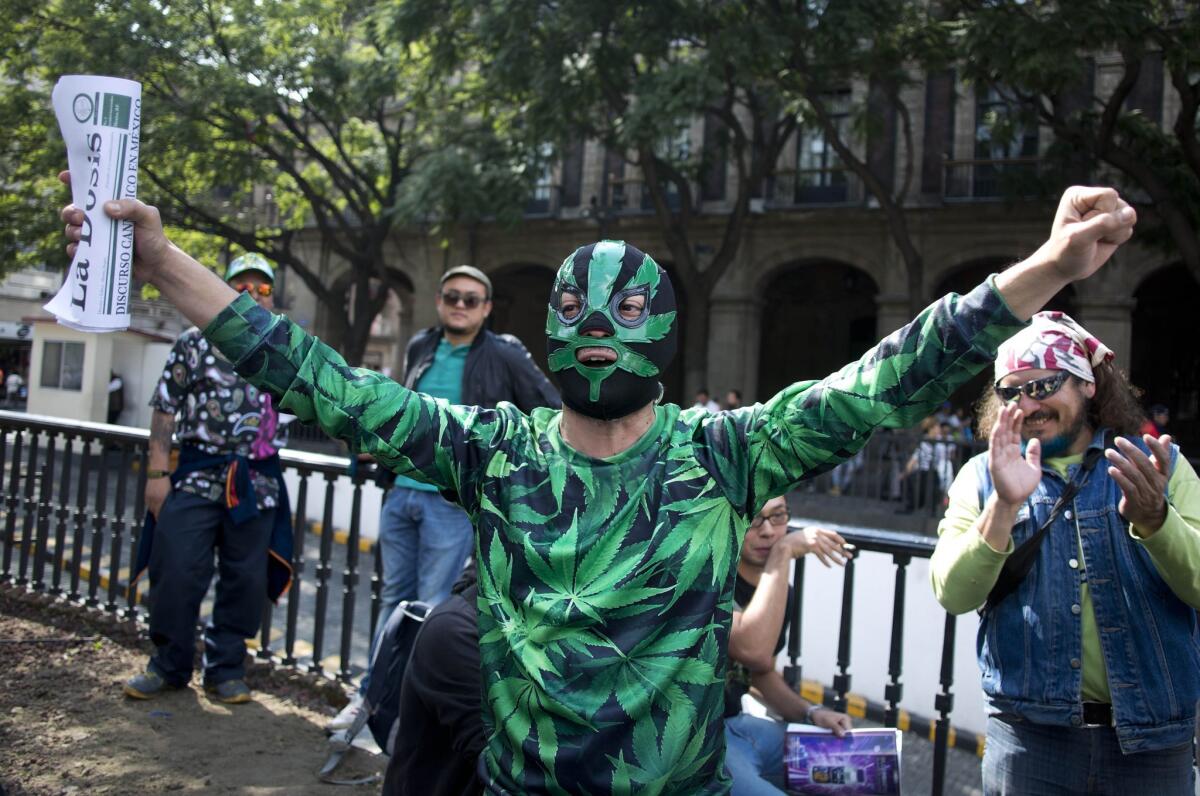Op-Ed: If Mexico legalizes marijuana, what will the U.S. do?

A supporter of marijuana legalization celebrates outside the Supreme Court after it ruled to legalize marijuana on Nov. 4.
Mexico may soon enter an elite club composed of Holland, Portugal, Uruguay and Colorado, Oregon and Washington state: It’s on the verge of excluding marijuana from the destructive war on drugs. But will the United States stand in its way?
On Nov. 4, Mexico’s Supreme Court voted by a wide margin to declare unconstitutional the country’s ban on the production, possession and recreational consumption of marijuana. A group of citizens had banded together in a so-called cannabis club (named SMART, for the initials in Spanish of its full title) and requested permission to grow and exchange marijuana among themselves; the government’s health agency (the equivalent of the U.S. Food and Drug Administration) denied them permission; the group sought a writ of habeas corpus, and went all the way to the Supreme Court, which granted them the writ and ordered the agency to legalize the club and allow it to function.
This decision does not entail an across-the-board decriminalization of recreational marijuana. For the moment, it applies only to the group that sought permission. But the court’s ruling may eventually extend to everyone seeking to grow or consume the drug.
The ruling means a great deal for Mexico.
Absent injury to third parties, the court resolved that, under the constitution, every individual has the right to enjoy life as he or she sees fit, and that secondary legislation — like prohibiting marijuana — cannot curtail that right.
The court also ruled that although marijuana may cause some degree of harm to some adult users in large quantities, prohibition is an excessive antidote to that harm. Other dangerous substances, such as alcohol and tobacco, are legal and subject to regulation, so why not marijuana?
Unlike in the U.S., public opinion in Mexico is against legalizing pot, which is why SMART chose the judicial road instead of pursuing a legislative approach. Recent history has shown that once the courts resolve controversial social issues — abortion, same-sex marriage, living wills — public opinion shifts and eventually comes around to the more progressive view.
The ruling means a great deal for Mexico. Domestically, it probably spells the beginning of the end of its bloody, costly, fruitless war of choice on marijuana. It will be increasingly awkward for the country’s armed forces and police to prosecute growers, wholesale traffickers and retail dealers of a substance that can be grown and consumed legally, if not yet bought and sold freely.
The decision will not immediately affect the country’s cartels, or the rising (once again) levels of drug-related violence and corruption. It will, however, eventually bring down marijuana prices, which over time will damage the cartels’ business. And if President Enrique Peña Nieto wishes to continue the drug war, the decision will free him to concentrate on heroin and methamphetamines (produced in Mexico) and cocaine (brought from South America).
For the country’s always prickly ties with Washington, Mexico’s Supreme Court ruling could cut either way. If hard-liners in the U.S. — the Drug Enforcement Administration and its supporters in Congress — determine the American response, there will be trouble.
Washington can insist on Mexico honoring a strict interpretation of United Nations conventions against all drugs, including marijuana. It can pressure Mexico, as it has done in the past, to keep intercepting marijuana shipments to the U.S., uprooting marijuana plantations, searching for tunnels across the border and jailing young people for nonviolent drug offenses.
Or, if President Obama as well as the moderates in the State and Justice departments run the show, the decision could serve as a much-needed excuse to rethink prohibition.
Just as Obama wisely decided not to interfere with state-level legalization in the U.S., he could encourage Peña Nieto not to interfere with the court decision. Both governments could unite in making clear that the ruling, plus next year’s probable legalization of recreational use in California, make the war on drugs unmanageable.
Both the U.S. and Mexico would then have no choice but to search for alternative solutions, and leave behind the punitive, security-based approach Washington has imposed on the world since the early 1970s.
Jorge Castañeda served as foreign minister of Mexico under President Vicente Fox. He is a professor of politics and Latin American and Caribbean studies at New York University.
Hoy: Léa esta historia en español
Follow the Opinion section on Twitter @latimesopinion and Facebook
More to Read
A cure for the common opinion
Get thought-provoking perspectives with our weekly newsletter.
You may occasionally receive promotional content from the Los Angeles Times.










